Legal Analysis of the ACCC v TPG Internet Pty Ltd Case Study
VerifiedAdded on 2023/06/05
|6
|1585
|391
Case Study
AI Summary
This case study examines the legal dispute between the Australian Competition and Consumer Commission (ACCC) and TPG Internet Pty Ltd regarding misleading advertising practices. The core of the case revolves around advertisements promoting unlimited ADSL+ service at a specific price, while failing to prominently disclose additional costs such as mandatory bundling with home telephone services, setup fees, and deposits. The ACCC argued that these advertisements were misleading and deceptive, violating sections 52 of the Trade Practices Act (TPA) and s18 of the Australian Consumer Law (ACL), along with provisions related to the prominent display of the total package price. The court agreed with the ACCC, finding that the advertisements failed to clearly present the complete cost, thereby breaching consumer protection laws. The analysis delves into the court's reasoning, the significance of the 'dominant message' in the advertisements, and the implications for businesses, particularly in industries like fitness centers, regarding transparent and comprehensive advertising practices to avoid misleading consumers. The case underscores the importance of clear and accurate communication of all costs associated with a service, and the potential consequences of failing to do so.
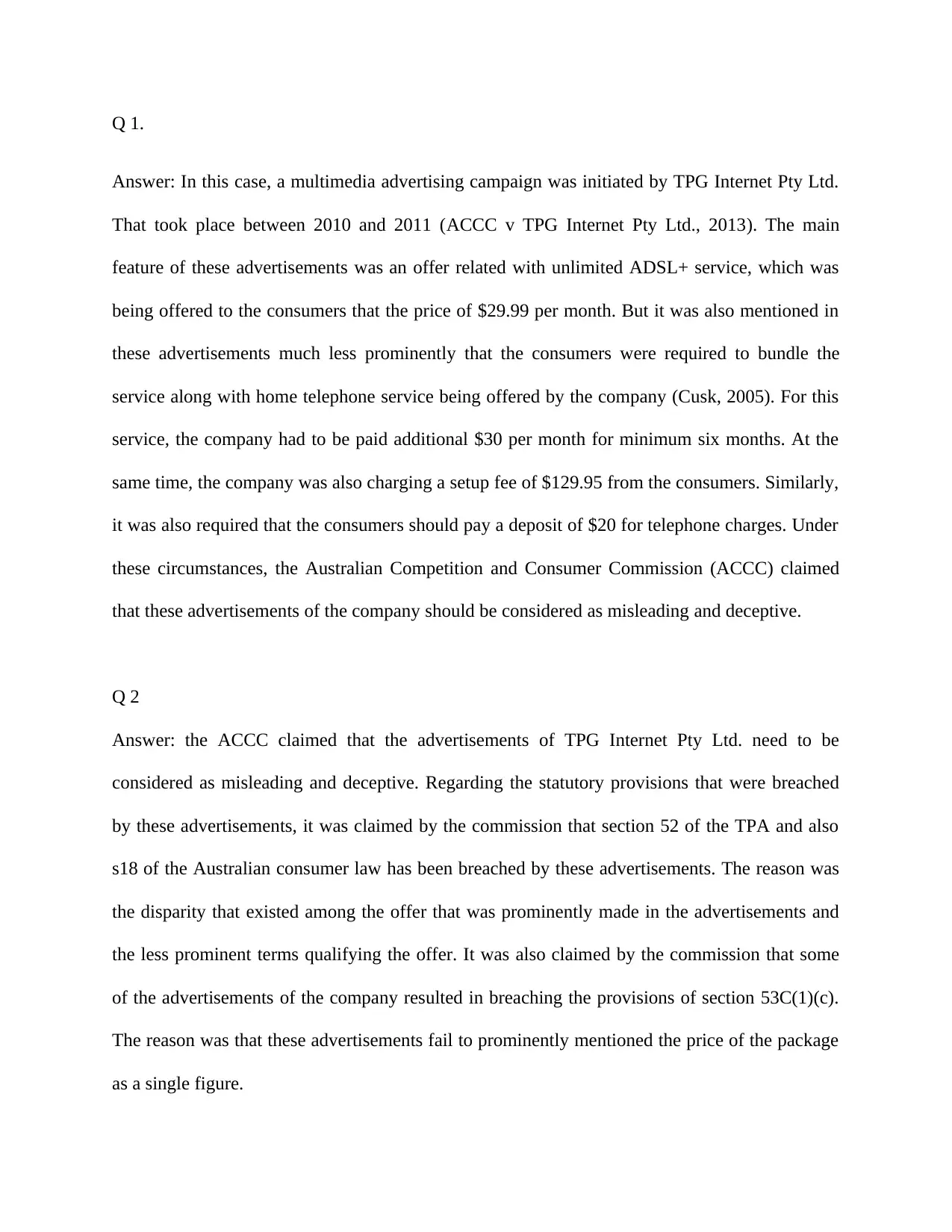
Q 1.
Answer: In this case, a multimedia advertising campaign was initiated by TPG Internet Pty Ltd.
That took place between 2010 and 2011 (ACCC v TPG Internet Pty Ltd., 2013). The main
feature of these advertisements was an offer related with unlimited ADSL+ service, which was
being offered to the consumers that the price of $29.99 per month. But it was also mentioned in
these advertisements much less prominently that the consumers were required to bundle the
service along with home telephone service being offered by the company (Cusk, 2005). For this
service, the company had to be paid additional $30 per month for minimum six months. At the
same time, the company was also charging a setup fee of $129.95 from the consumers. Similarly,
it was also required that the consumers should pay a deposit of $20 for telephone charges. Under
these circumstances, the Australian Competition and Consumer Commission (ACCC) claimed
that these advertisements of the company should be considered as misleading and deceptive.
Q 2
Answer: the ACCC claimed that the advertisements of TPG Internet Pty Ltd. need to be
considered as misleading and deceptive. Regarding the statutory provisions that were breached
by these advertisements, it was claimed by the commission that section 52 of the TPA and also
s18 of the Australian consumer law has been breached by these advertisements. The reason was
the disparity that existed among the offer that was prominently made in the advertisements and
the less prominent terms qualifying the offer. It was also claimed by the commission that some
of the advertisements of the company resulted in breaching the provisions of section 53C(1)(c).
The reason was that these advertisements fail to prominently mentioned the price of the package
as a single figure.
Answer: In this case, a multimedia advertising campaign was initiated by TPG Internet Pty Ltd.
That took place between 2010 and 2011 (ACCC v TPG Internet Pty Ltd., 2013). The main
feature of these advertisements was an offer related with unlimited ADSL+ service, which was
being offered to the consumers that the price of $29.99 per month. But it was also mentioned in
these advertisements much less prominently that the consumers were required to bundle the
service along with home telephone service being offered by the company (Cusk, 2005). For this
service, the company had to be paid additional $30 per month for minimum six months. At the
same time, the company was also charging a setup fee of $129.95 from the consumers. Similarly,
it was also required that the consumers should pay a deposit of $20 for telephone charges. Under
these circumstances, the Australian Competition and Consumer Commission (ACCC) claimed
that these advertisements of the company should be considered as misleading and deceptive.
Q 2
Answer: the ACCC claimed that the advertisements of TPG Internet Pty Ltd. need to be
considered as misleading and deceptive. Regarding the statutory provisions that were breached
by these advertisements, it was claimed by the commission that section 52 of the TPA and also
s18 of the Australian consumer law has been breached by these advertisements. The reason was
the disparity that existed among the offer that was prominently made in the advertisements and
the less prominent terms qualifying the offer. It was also claimed by the commission that some
of the advertisements of the company resulted in breaching the provisions of section 53C(1)(c).
The reason was that these advertisements fail to prominently mentioned the price of the package
as a single figure.
Paraphrase This Document
Need a fresh take? Get an instant paraphrase of this document with our AI Paraphraser
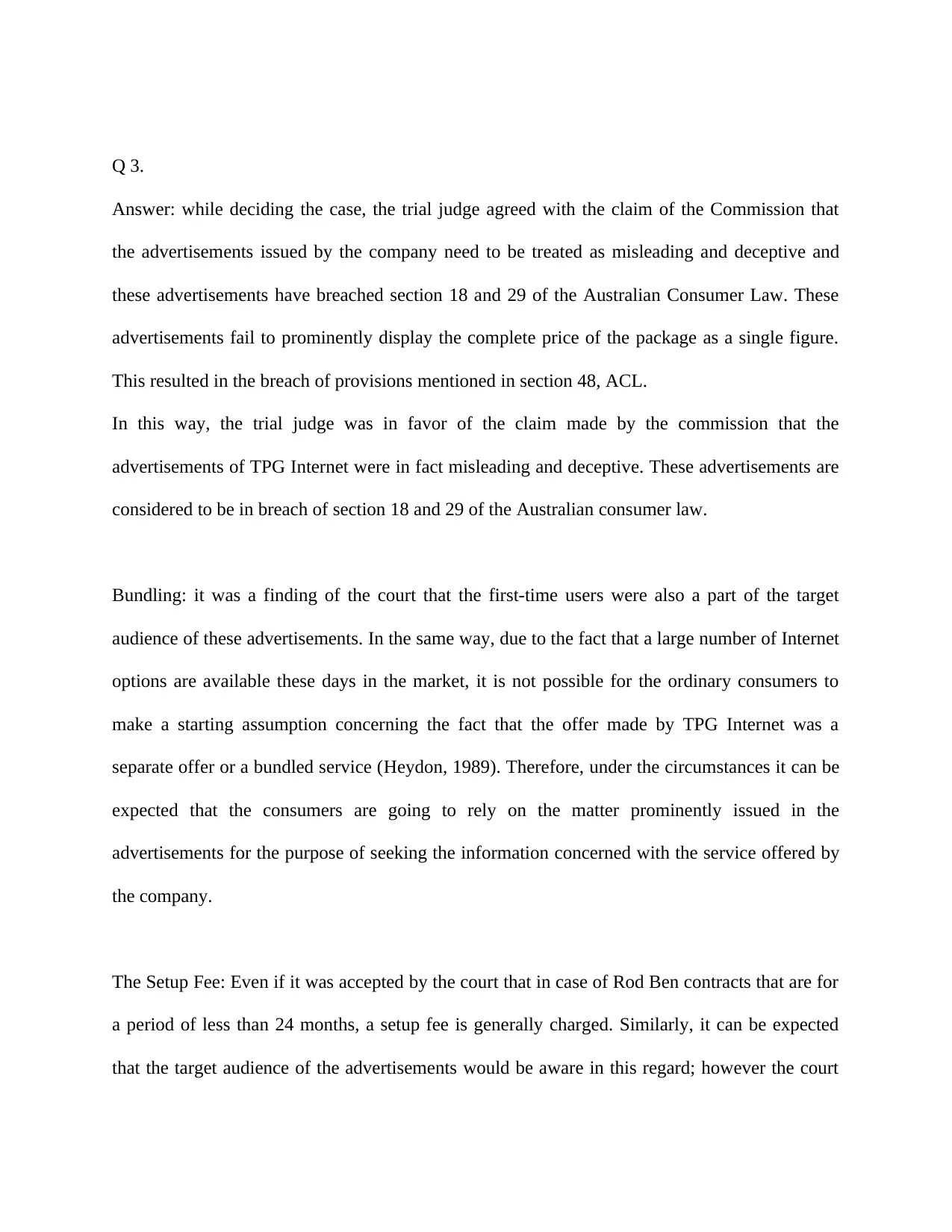
Q 3.
Answer: while deciding the case, the trial judge agreed with the claim of the Commission that
the advertisements issued by the company need to be treated as misleading and deceptive and
these advertisements have breached section 18 and 29 of the Australian Consumer Law. These
advertisements fail to prominently display the complete price of the package as a single figure.
This resulted in the breach of provisions mentioned in section 48, ACL.
In this way, the trial judge was in favor of the claim made by the commission that the
advertisements of TPG Internet were in fact misleading and deceptive. These advertisements are
considered to be in breach of section 18 and 29 of the Australian consumer law.
Bundling: it was a finding of the court that the first-time users were also a part of the target
audience of these advertisements. In the same way, due to the fact that a large number of Internet
options are available these days in the market, it is not possible for the ordinary consumers to
make a starting assumption concerning the fact that the offer made by TPG Internet was a
separate offer or a bundled service (Heydon, 1989). Therefore, under the circumstances it can be
expected that the consumers are going to rely on the matter prominently issued in the
advertisements for the purpose of seeking the information concerned with the service offered by
the company.
The Setup Fee: Even if it was accepted by the court that in case of Rod Ben contracts that are for
a period of less than 24 months, a setup fee is generally charged. Similarly, it can be expected
that the target audience of the advertisements would be aware in this regard; however the court
Answer: while deciding the case, the trial judge agreed with the claim of the Commission that
the advertisements issued by the company need to be treated as misleading and deceptive and
these advertisements have breached section 18 and 29 of the Australian Consumer Law. These
advertisements fail to prominently display the complete price of the package as a single figure.
This resulted in the breach of provisions mentioned in section 48, ACL.
In this way, the trial judge was in favor of the claim made by the commission that the
advertisements of TPG Internet were in fact misleading and deceptive. These advertisements are
considered to be in breach of section 18 and 29 of the Australian consumer law.
Bundling: it was a finding of the court that the first-time users were also a part of the target
audience of these advertisements. In the same way, due to the fact that a large number of Internet
options are available these days in the market, it is not possible for the ordinary consumers to
make a starting assumption concerning the fact that the offer made by TPG Internet was a
separate offer or a bundled service (Heydon, 1989). Therefore, under the circumstances it can be
expected that the consumers are going to rely on the matter prominently issued in the
advertisements for the purpose of seeking the information concerned with the service offered by
the company.
The Setup Fee: Even if it was accepted by the court that in case of Rod Ben contracts that are for
a period of less than 24 months, a setup fee is generally charged. Similarly, it can be expected
that the target audience of the advertisements would be aware in this regard; however the court
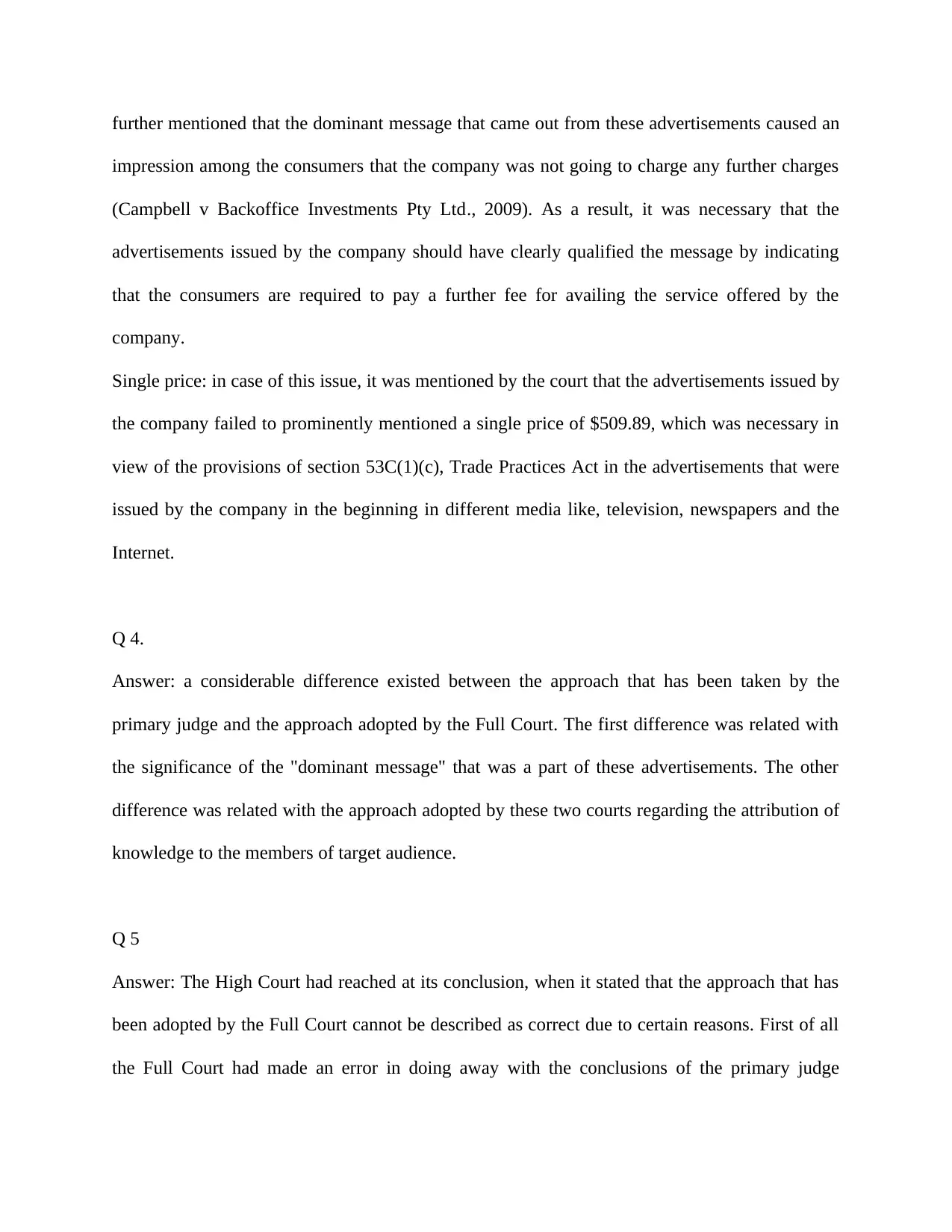
further mentioned that the dominant message that came out from these advertisements caused an
impression among the consumers that the company was not going to charge any further charges
(Campbell v Backoffice Investments Pty Ltd., 2009). As a result, it was necessary that the
advertisements issued by the company should have clearly qualified the message by indicating
that the consumers are required to pay a further fee for availing the service offered by the
company.
Single price: in case of this issue, it was mentioned by the court that the advertisements issued by
the company failed to prominently mentioned a single price of $509.89, which was necessary in
view of the provisions of section 53C(1)(c), Trade Practices Act in the advertisements that were
issued by the company in the beginning in different media like, television, newspapers and the
Internet.
Q 4.
Answer: a considerable difference existed between the approach that has been taken by the
primary judge and the approach adopted by the Full Court. The first difference was related with
the significance of the "dominant message" that was a part of these advertisements. The other
difference was related with the approach adopted by these two courts regarding the attribution of
knowledge to the members of target audience.
Q 5
Answer: The High Court had reached at its conclusion, when it stated that the approach that has
been adopted by the Full Court cannot be described as correct due to certain reasons. First of all
the Full Court had made an error in doing away with the conclusions of the primary judge
impression among the consumers that the company was not going to charge any further charges
(Campbell v Backoffice Investments Pty Ltd., 2009). As a result, it was necessary that the
advertisements issued by the company should have clearly qualified the message by indicating
that the consumers are required to pay a further fee for availing the service offered by the
company.
Single price: in case of this issue, it was mentioned by the court that the advertisements issued by
the company failed to prominently mentioned a single price of $509.89, which was necessary in
view of the provisions of section 53C(1)(c), Trade Practices Act in the advertisements that were
issued by the company in the beginning in different media like, television, newspapers and the
Internet.
Q 4.
Answer: a considerable difference existed between the approach that has been taken by the
primary judge and the approach adopted by the Full Court. The first difference was related with
the significance of the "dominant message" that was a part of these advertisements. The other
difference was related with the approach adopted by these two courts regarding the attribution of
knowledge to the members of target audience.
Q 5
Answer: The High Court had reached at its conclusion, when it stated that the approach that has
been adopted by the Full Court cannot be described as correct due to certain reasons. First of all
the Full Court had made an error in doing away with the conclusions of the primary judge
⊘ This is a preview!⊘
Do you want full access?
Subscribe today to unlock all pages.

Trusted by 1+ million students worldwide
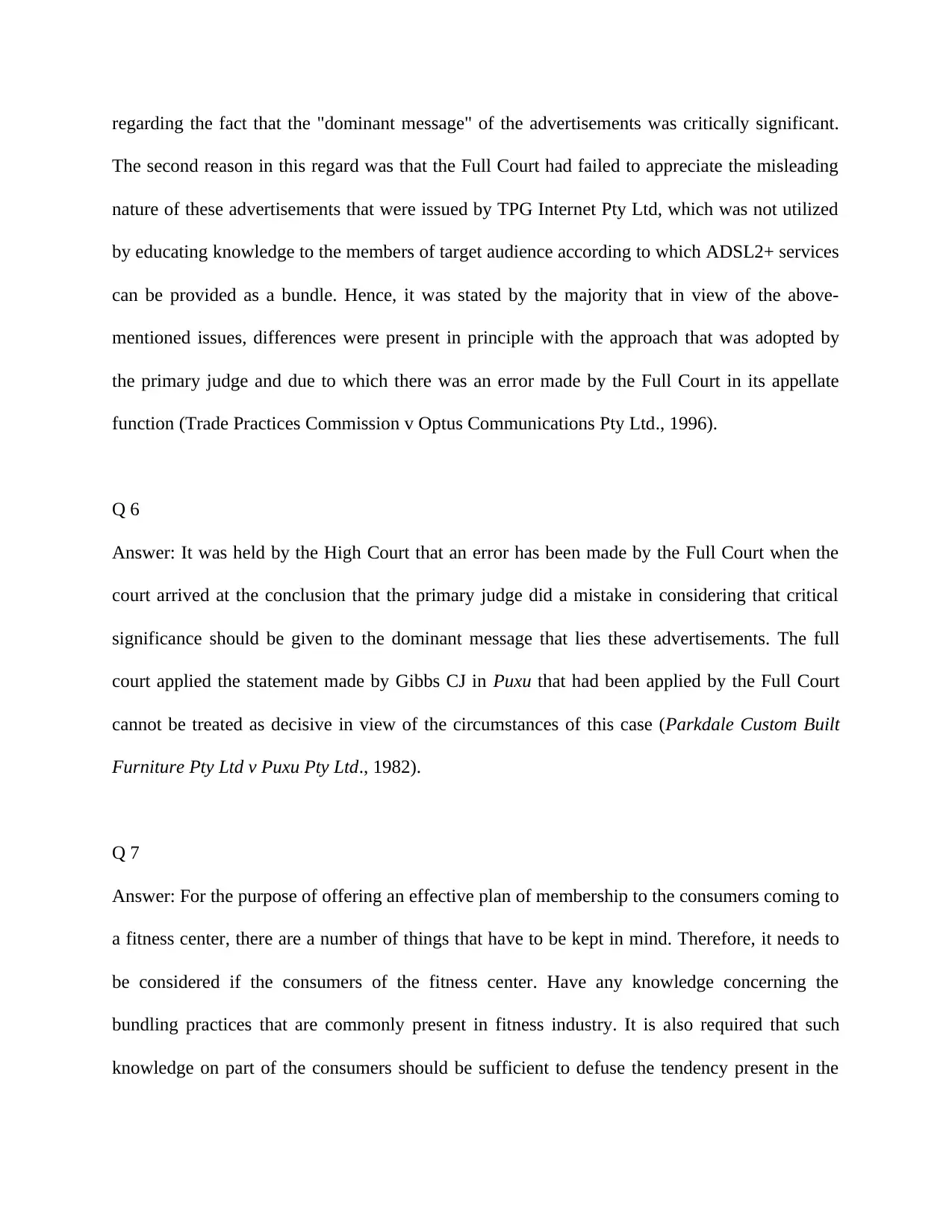
regarding the fact that the "dominant message" of the advertisements was critically significant.
The second reason in this regard was that the Full Court had failed to appreciate the misleading
nature of these advertisements that were issued by TPG Internet Pty Ltd, which was not utilized
by educating knowledge to the members of target audience according to which ADSL2+ services
can be provided as a bundle. Hence, it was stated by the majority that in view of the above-
mentioned issues, differences were present in principle with the approach that was adopted by
the primary judge and due to which there was an error made by the Full Court in its appellate
function (Trade Practices Commission v Optus Communications Pty Ltd., 1996).
Q 6
Answer: It was held by the High Court that an error has been made by the Full Court when the
court arrived at the conclusion that the primary judge did a mistake in considering that critical
significance should be given to the dominant message that lies these advertisements. The full
court applied the statement made by Gibbs CJ in Puxu that had been applied by the Full Court
cannot be treated as decisive in view of the circumstances of this case (Parkdale Custom Built
Furniture Pty Ltd v Puxu Pty Ltd., 1982).
Q 7
Answer: For the purpose of offering an effective plan of membership to the consumers coming to
a fitness center, there are a number of things that have to be kept in mind. Therefore, it needs to
be considered if the consumers of the fitness center. Have any knowledge concerning the
bundling practices that are commonly present in fitness industry. It is also required that such
knowledge on part of the consumers should be sufficient to defuse the tendency present in the
The second reason in this regard was that the Full Court had failed to appreciate the misleading
nature of these advertisements that were issued by TPG Internet Pty Ltd, which was not utilized
by educating knowledge to the members of target audience according to which ADSL2+ services
can be provided as a bundle. Hence, it was stated by the majority that in view of the above-
mentioned issues, differences were present in principle with the approach that was adopted by
the primary judge and due to which there was an error made by the Full Court in its appellate
function (Trade Practices Commission v Optus Communications Pty Ltd., 1996).
Q 6
Answer: It was held by the High Court that an error has been made by the Full Court when the
court arrived at the conclusion that the primary judge did a mistake in considering that critical
significance should be given to the dominant message that lies these advertisements. The full
court applied the statement made by Gibbs CJ in Puxu that had been applied by the Full Court
cannot be treated as decisive in view of the circumstances of this case (Parkdale Custom Built
Furniture Pty Ltd v Puxu Pty Ltd., 1982).
Q 7
Answer: For the purpose of offering an effective plan of membership to the consumers coming to
a fitness center, there are a number of things that have to be kept in mind. Therefore, it needs to
be considered if the consumers of the fitness center. Have any knowledge concerning the
bundling practices that are commonly present in fitness industry. It is also required that such
knowledge on part of the consumers should be sufficient to defuse the tendency present in the
Paraphrase This Document
Need a fresh take? Get an instant paraphrase of this document with our AI Paraphraser
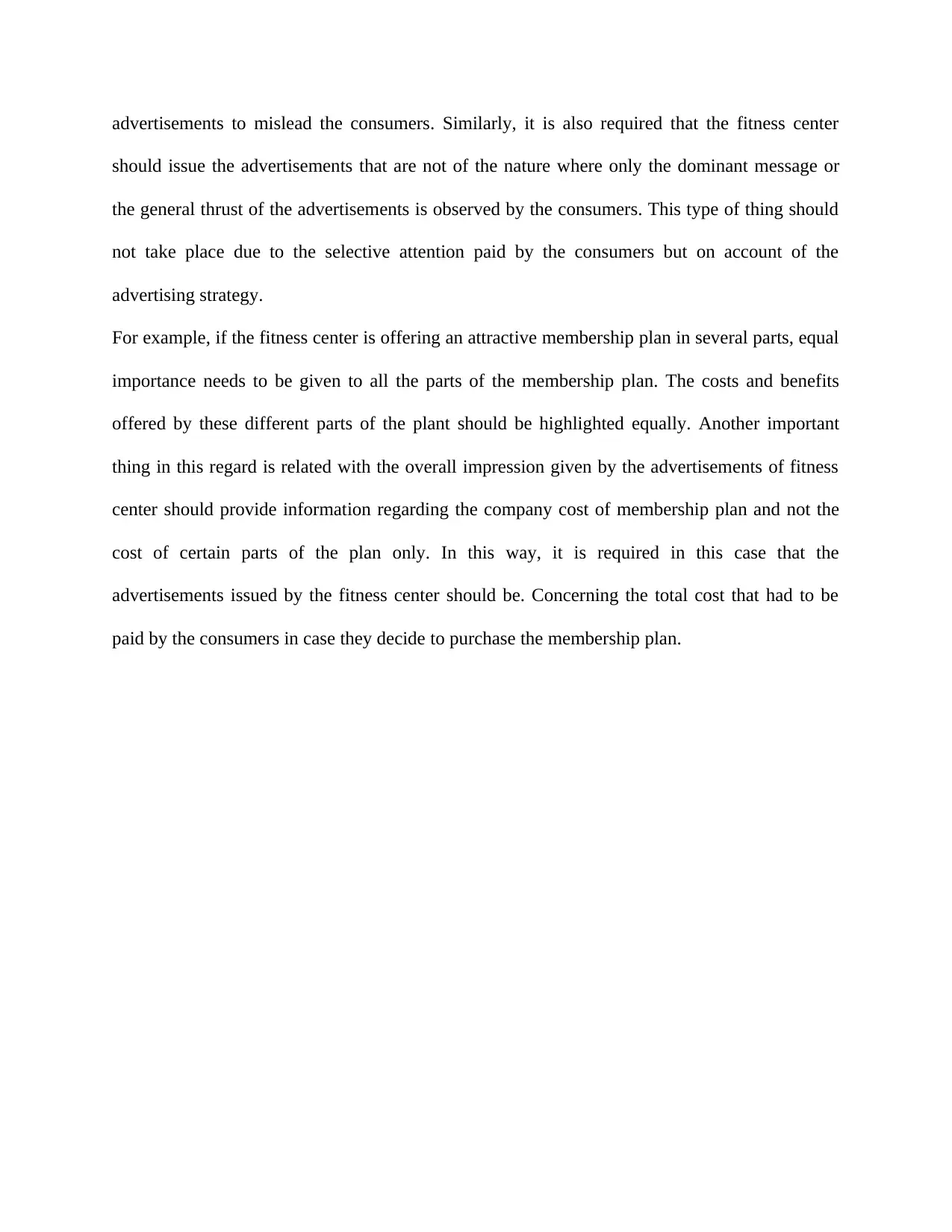
advertisements to mislead the consumers. Similarly, it is also required that the fitness center
should issue the advertisements that are not of the nature where only the dominant message or
the general thrust of the advertisements is observed by the consumers. This type of thing should
not take place due to the selective attention paid by the consumers but on account of the
advertising strategy.
For example, if the fitness center is offering an attractive membership plan in several parts, equal
importance needs to be given to all the parts of the membership plan. The costs and benefits
offered by these different parts of the plant should be highlighted equally. Another important
thing in this regard is related with the overall impression given by the advertisements of fitness
center should provide information regarding the company cost of membership plan and not the
cost of certain parts of the plan only. In this way, it is required in this case that the
advertisements issued by the fitness center should be. Concerning the total cost that had to be
paid by the consumers in case they decide to purchase the membership plan.
should issue the advertisements that are not of the nature where only the dominant message or
the general thrust of the advertisements is observed by the consumers. This type of thing should
not take place due to the selective attention paid by the consumers but on account of the
advertising strategy.
For example, if the fitness center is offering an attractive membership plan in several parts, equal
importance needs to be given to all the parts of the membership plan. The costs and benefits
offered by these different parts of the plant should be highlighted equally. Another important
thing in this regard is related with the overall impression given by the advertisements of fitness
center should provide information regarding the company cost of membership plan and not the
cost of certain parts of the plan only. In this way, it is required in this case that the
advertisements issued by the fitness center should be. Concerning the total cost that had to be
paid by the consumers in case they decide to purchase the membership plan.
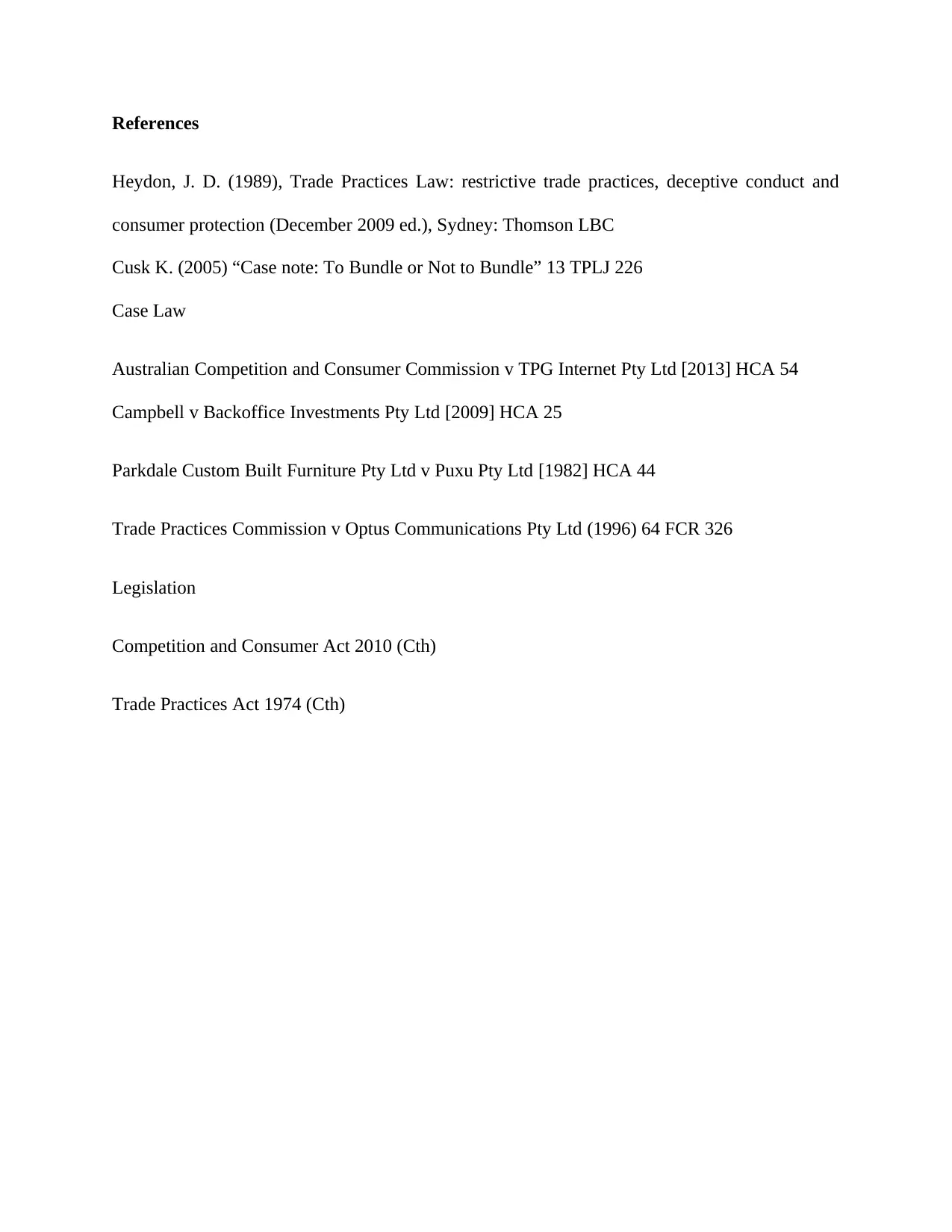
References
Heydon, J. D. (1989), Trade Practices Law: restrictive trade practices, deceptive conduct and
consumer protection (December 2009 ed.), Sydney: Thomson LBC
Cusk K. (2005) “Case note: To Bundle or Not to Bundle” 13 TPLJ 226
Case Law
Australian Competition and Consumer Commission v TPG Internet Pty Ltd [2013] HCA 54
Campbell v Backoffice Investments Pty Ltd [2009] HCA 25
Parkdale Custom Built Furniture Pty Ltd v Puxu Pty Ltd [1982] HCA 44
Trade Practices Commission v Optus Communications Pty Ltd (1996) 64 FCR 326
Legislation
Competition and Consumer Act 2010 (Cth)
Trade Practices Act 1974 (Cth)
Heydon, J. D. (1989), Trade Practices Law: restrictive trade practices, deceptive conduct and
consumer protection (December 2009 ed.), Sydney: Thomson LBC
Cusk K. (2005) “Case note: To Bundle or Not to Bundle” 13 TPLJ 226
Case Law
Australian Competition and Consumer Commission v TPG Internet Pty Ltd [2013] HCA 54
Campbell v Backoffice Investments Pty Ltd [2009] HCA 25
Parkdale Custom Built Furniture Pty Ltd v Puxu Pty Ltd [1982] HCA 44
Trade Practices Commission v Optus Communications Pty Ltd (1996) 64 FCR 326
Legislation
Competition and Consumer Act 2010 (Cth)
Trade Practices Act 1974 (Cth)
⊘ This is a preview!⊘
Do you want full access?
Subscribe today to unlock all pages.

Trusted by 1+ million students worldwide
1 out of 6
Related Documents
Your All-in-One AI-Powered Toolkit for Academic Success.
+13062052269
info@desklib.com
Available 24*7 on WhatsApp / Email
![[object Object]](/_next/static/media/star-bottom.7253800d.svg)
Unlock your academic potential
Copyright © 2020–2026 A2Z Services. All Rights Reserved. Developed and managed by ZUCOL.




